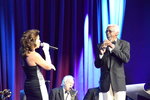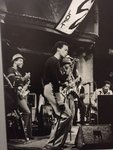

For all the doctors in Ridgefield, only one can claim to have met Miles Davis and has been to the Grammys.
Though he’s not a medical doctor, Ridgefield resident David Watson is known by many as the “Doctor of Bebop,” a nickname received over more than six decades of playing jazz. Most recently, Watson and his band, “Rebirthing the Cool: Bebop & Beyond” took to the relatively new Muze lounge stage at ilani Casino Dec. 11, playing a selection of arrangements fitting of their name.
Although the 80-year-old Watson is currently entrenched within the Portland-area jazz scene, his roots are in the East Coast, being born in Florida and growing up in Philadelphia. His first steps into music were humble — Watson cites a school play performance in which he sung “Three Blind Mice” as the first inkling of his talent.
Around the time Watson was 8 he heard Ella Fitzgerald and he had a “spiritual experience” turning him toward the artform.
“It changed my life, what I heard from her,” Watson said. “That was the beginning and it hasn’t stopped since.”
In Philadelphia every other bar passed would have live music playing, Watson said, though he was on the periphery before he was old enough to patronize. After a stint in the Army, Watson landed a job at one of the country’s premier jazz clubs — Philadelphia’s Showboat — working as a bartender.
During his time working he got to meet many of the artists he admired — Miles Davis, Sonny Rollins and Thelonious Monk to name a few — everyone but Fitzgerald herself, though she had been a patron of the establishment when Watson was on bar duty.
While at the Showboat Watson was only moonlighting as a singer while working bar. It wasn’t until Walter Booker, bassist for Cannonball Adderley, gave Watson the idea to pursue drumming and singing, something Watson could do.
“That was the first person who actually said ‘go ahead on, you can do this thing,’” Watson remarked.
Upon the closure of the Showboat Watson headed west to San Francisco in 1971 where his career as a professional jazz musician began in earnest. Following a trip to Alaska for close to a year to play he began to drift from duo drum and vocal duties, instead focusing exclusively on the vocal performance.
Spurred on by the likes of Davis, Jon Hendricks and Charlie Parker, taking what normally would be a solo instrument and replacing it with a vocalist was right up Watson’s alley.
“That’s when I really moved into what I do today,” Watson said.
Watson’s route to Ridgefield was a meandering one taking him halfway across the Pacific and back. Upon moving to Sonoma with his wife, Sarah, Watson spent time promoting music, booking groups at one of the area’s many wineries and coordinating jazz festivals in the region.
After feeling a bit burnt out in wine country the Watsons moved to Hawaii for eight years and when Sarah was tired of that locale Washington was next on the list for their travels.
Two things factored in Watson’s decision to settle in Ridgefield. During a layover in Portland he stumbled upon the recently-closed Jimmy Mak’s. He recognized some of the names on the lineup and the owner, Jimmy Makarounis, was also there. He gave Makarounis a rough cut of an album he had just completed which was enough for Watson to get a job at the club upon the Watsons return to the mainland.
Watson commented on the warm reception he received in the Portland metro, something that set it apart from the other places he had played.
“The band that I have, we are like family,” Watson said about his current band who have been an outfit for more than three years. “I haven’t encountered this sort of camaraderie with musicians in a long time. It definitely is not like this in the Bay Area.”
Other than the jazz scene, Watson took notice of Ridgefield’s American Legion Post 44, whose community service efforts impressed him enough to pick the city as where he would land.
While in the area Watson met Portland jazz titans Ron Steen and Mel Brown, with the former coming up with Watson’s nickname. Apart from everyone in the area calling him “Doc” the title has gone national.
“I went to a club in New York and someone yells, ‘hey, Doc,’” Watson remarked. “It has followed me.”
Although he has delved into all aspects of jazz and some other related genres, Bebop is his specialty, Watson said.
“I love it when musicians can swing,” Watson said, commenting that the musicians in his current band have a good feel of the musical “pocket” so integral to a good, swinging song.
Watson also likes playing with the younger generations. In a popular music landscape that has evolved far from the roots of jazz, Watson said it was important not to lose sight of those roots.
Watson referenced lyrics he wrote about a song documenting the rize of jazz in New York City, “you can’t get to the future unless you visit the past,” as summing up the importance of the artform moving forward, keeping sight of musical roots while maybe going off in a new direction to continue the evolution.
“Regardless of how contemporary the music is today, it has to come from some place,” Watson remarked.